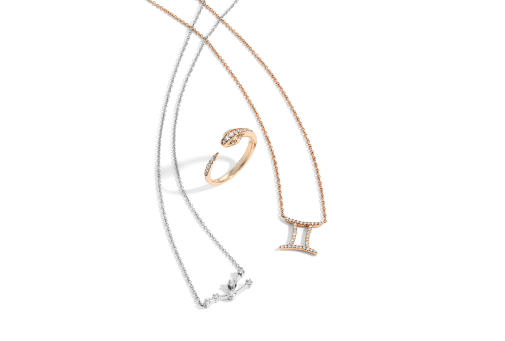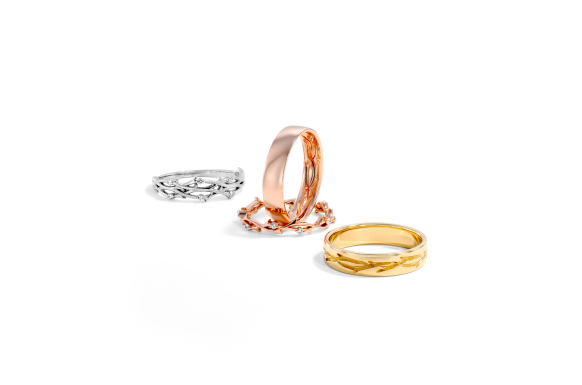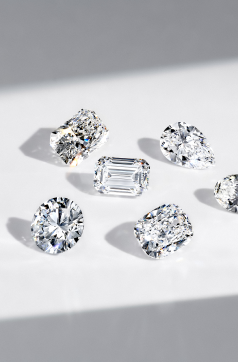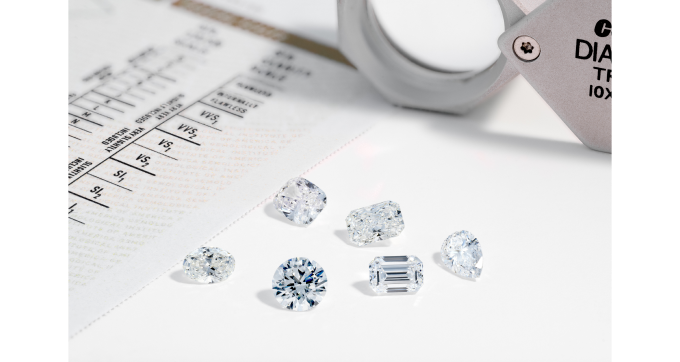At this point, everybody knows that conflict diamonds, aka blood diamonds, exist. But should you be worried about them, and how do you even know you're not buying one in the first place?
At Keyzar, we go to every length to ensure our diamonds are 100% conflict-free. These days that means going way above and beyond simply trusting the Kimberley Process. Bummer, right? We know.
But fear not, friends! Buying conflict-free is totally possible. Knowing the loopholes and pitfalls dirty diamond sellers lean on is a good start. There's more than one way to shine a diamond, so here's everything you need to know to go 100% conflict-free, guaranteed.
What Does Conflict-Free Even Mean?
Saying a diamond is conflict-free is much more than just a statement. It's a whole ordeal.
Conflict-free diamonds are mined, shipped, distributed, etc., without any connection to major baddies. Specifically, it refers to rebel forces or their allies who might use the funds of diamond sales and distributions to undermine legit governments.
Unfortunately, it's not always possible to ensure a diamond is conflict-free, as many majorly awful rebel groups launder diamonds. Many diamond sellers hang their hats on the Kimberely Process, hoping that will be enough to sell peace of mind to their customers. For real, tho, the total bummer is the Process is full of loopholes and blind spots –*cough* child labor *cough*– that make these claims hard to swallow.
The good news is that many companies offer conflict-free diamonds. If the whole diamond business still sketches you out, there are a few ways different ways you can sidestep the entire can of worms. Let's get into it.
Do Conflict-Free Diamonds Exist?
Yes, absolutely, 100%. While it's tricky to know based on conflict-free claims alone, there are definitely companies out there that put in the extra effort to make sure the mined diamonds they sell are ethically sourced and 100% conflict-free. Hi, it's us, we're companies! We work with some of the biggest diamond suppliers in the world to offer conflict-free and sustainable diamonds.
We are also happy to say that many of our rival companies also put in the work and go above and beyond the Kimberly Process to ensure they are selling only what they are sure is absolutely conflict-free diamonds.
And as much as we love to talk trash about big diamond companies like DeBeers for jacking up diamond prices–which they totally do, but we digress–they and many other companies like them are putting in the work to fund ethical diamond mining. It's an issue we can all get behind.
This is a problem that more and more people are becoming aware of, which means that more and more companies are working towards solutions. New ideas are coming to the table all the time in an effort to make the diamond mining process even more transparent from start to finish.
Some companies are even using blockchain technologies (yeah, they mine more than bitcoin) to track diamonds on their raw to retail journey. While this tech isn't perfect yet, there are a ton of things you can do today to make sure you're getting a diamond with a no-worries guarantee. Buying conflict-free is as easy as shopping with a company you trust and doing a little research. Or, if you'd like to go in a different direction that is entirely worry-free, consider lab-grown. It's the same diamond with zero ethical questions. It'll also save you a bundle, but that's a story for a different day.
So What's Wrong With the Kimberley Process?
Look, we love the Kimberley Process, not because it's perfect, but because it's progress. The Kimberly Process was implemented in 2003 when a bunch of member states of the United Nations decided something had to change in the diamond mining industry, and it did.
Over 70 countries participate in the Process, which ensures specific requirements and regulations which track each diamond from mine to market, ensuring they are all certified conflict-free. This Process has taken tons of blood diamonds off the market. Since it was first implemented, the number of crimes associated with conflict diamonds has dropped considerably. However, it's not a perfect system.
The language in the Kimberley Process prohibits the sale of rough diamonds, which rebel terror groups use to finance conflicts aimed at legitimate governments. It doesn't say anything about the working conditions (or age restrictions) of miners, who are often minors.
This relatively huge loophole may curb militia violence aimed at governing bodies. Still, it does little for the adults and children who are forced to work in unsafe mining conditions. Additionally, the Process tracks batches, not single stones. A diamond changes hands so many times before it makes it from mine to market that it's just hard to really know where diamonds are coming from or where they've been.
Recycled Gems
More like upcycled! Did you know there are a bajillion perfectly good diamonds out there floating around in your local antique store or pawn shop? Ok, not a bajillion. That's not an actual number, but a lot.
Recycling vintage diamonds into a new setting is not only a great way to customize your ring, but you're also recycling a diamond that is now 100% conflict-free.
Some of these beauties feature old-school cuts. So if you love a vintage vibe, or you live for that old-world ascetic, recycled diamonds might be just your vibe. While these stones can be the thrift find of all finds, they can also be passed down through families.
Fear, not contemporary queens. If you want a more modern look, there are tons of current cuts waiting to be redesigned by a twenty-first-century baddie like yourself. Repurposing a diamond gives it new life, whether you are going for a modern look with a sustainably sourced stone or a classic cut with victorian vibes. There is a diamond out there just waiting to be rescued.
Lab-Grown Realness
Still unsure about mined diamonds? Science has you covered! Probably the best way to get yourself a rock that is 100% conflict-free, ethical, sustainable, and, oh, a lot more affordable is to go with a lab-produced stone.
Lab-grown diamonds are completely identical to mined diamonds? Down to the atomic level, these little beauties are exactly the same as the diamonds you might dig out of some deep dark hole in the earth. The difference? Origins.
There are about a million and one reasons to choose lab-grown diamonds over mined, but since we're on the subject, let's start with ethics. While there might always be some lingering questions about mined diamonds, with lab-grown diamonds, you get the same diamond with a guarantee.
These stones were created in a lab by a well-paid scientist who gets to go home to their family for game night and gets weekends off to coach soccer. (I mean, theoretically, maybe it's T-Ball, you get the picture.)
When you choose a lab diamond, you choose the guarantee of an ethical and sustainable stone. Also, you get the same diamond for like half the price. So maybe instead of the same diamond, you get a much bigger one. With mined diamonds, we just don't always know. In any case, it's a conflict-free promise that makes us feel all warm and fuzzy, which we like much better than the alternative.
Must Be Moissanite
Ok, we love moissanite. And while we're on the subject of excellent alternatives, we thought we might as well bring it up.
Moissanite is a diamond simulant that comes with all the same worry-free promises as a lab diamond. Also created in a lab, this little stone packs quite the glittery punch. See, moissanite is known for its rainbow sparkle.
It gives off oodles of magic shine. It's almost as hard as a diamond, and it costs even less than a lab diamond. What does that mean? You can go home with the stone of your dreams and leave behind the nightmare of conflict diamonds.
And Then There's Our Process
We work with certified, ethical mines and gold resellers. We do not do business with organizations that do not meet our social, environmental, and human rights standards.
We screen our suppliers to make sure they offer no conflict diamonds or dirty gold. We do this by looking at their past purchase and sale histories, as well as carrying out our own primary research.
Sparkle On, Worry Not
Sometimes the world sucks. We know this.
But buying a diamond should be something that fills you and your partner with overwhelming joy. And while there might be a lot of questions out there surrounding diamonds, whether or not they're conflict-free shouldn't be one of them.
At the end of the day, there is one catch-all solution that we wholeheartedly stand by; There's never any question of ethics, sustainability, or origins when it comes to lab-created diamonds. So fear not, and save some money while you're at it!
This is a safe space, and it's our promise to you that at Keyzar, we only deal with diamonds that are 100% conflict-free. So when you shop with us, know you can do it worry-free.






